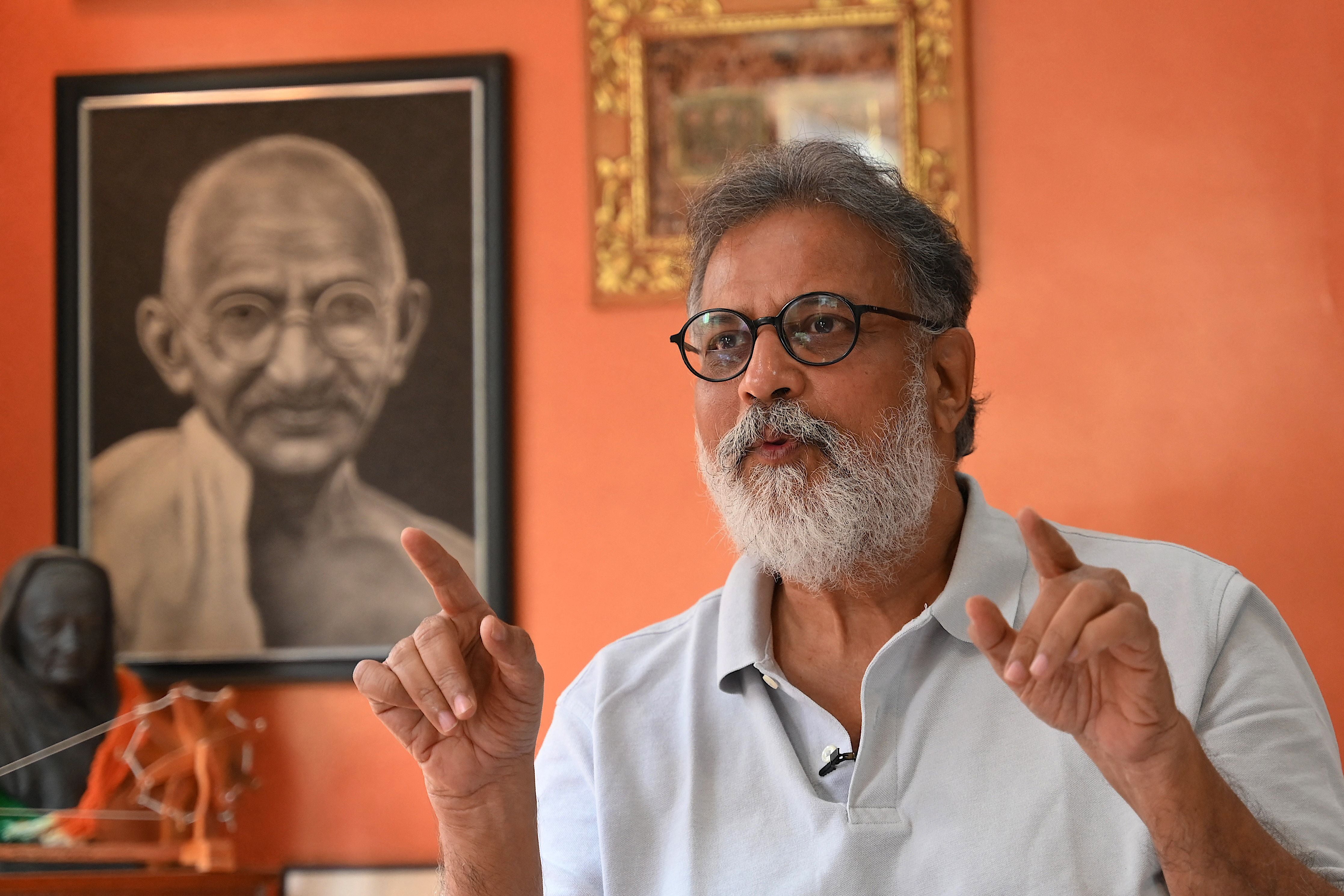Mahatma Gandhi’s great grandson detained on way to mark ‘Quit India’ day against British colonial rule
His detention comes on the same day Mahatma Gandhi and his wife Kasturba Gandhi were arrested in 1942 over the ‘Quit India’ movement

Your support helps us to tell the story
From reproductive rights to climate change to Big Tech, The Independent is on the ground when the story is developing. Whether it's investigating the financials of Elon Musk's pro-Trump PAC or producing our latest documentary, 'The A Word', which shines a light on the American women fighting for reproductive rights, we know how important it is to parse out the facts from the messaging.
At such a critical moment in US history, we need reporters on the ground. Your donation allows us to keep sending journalists to speak to both sides of the story.
The Independent is trusted by Americans across the entire political spectrum. And unlike many other quality news outlets, we choose not to lock Americans out of our reporting and analysis with paywalls. We believe quality journalism should be available to everyone, paid for by those who can afford it.
Your support makes all the difference.The great grandson of Indian freedom fighter Mahatma Gandhi was detained in Mumbai on Wednesday as he left his residence to commemorate an iconic feat of India’s freedom movement against colonial British rule.
Tushar Gandhi, the fourth generation of the revered Indian leader’s family, was headed to August Kranti Maidan to mark the “do or die” call of his great grandfather against the British rulers in 1942 when he was detained by the state police.
“Last night, Mumbai police realised that our event commemorating the freedom movement is a danger to law and order so they issued prohibitory orders. In the morning, I stepped out around 7 to go for the march but there was a police officer waiting outside my home who stopped me from going any further,” Mr Gandhi told The Independent in a phone call.
A contingent of about 20 police officials was deployed outside his house to prevent him from leaving.
The Mumbai police official told Mr Gandhi that he was not allowed to leave the premises.
“So I told him that if he wants to stop me, he will have to arrest me to which he said that he will not arrest me but if I try to go, he will arrest me,” he said.
“I told him, ‘consider I am trying to go’,” Mr Gandhi said.
The Mumbai police official then detained him and took him to the Santa Cruz police station in a police van, he said.
While the 60-year-old civil rights activist and author was not arrested and charged with anything, he was detained till the function of Maharashtra state government – which is backed partially by prime minister Narendra Modi’s ruling Bharatiya Janata Party (BJP) – in the vicinity was over.
His detention comes on the same day Mahatma Gandhi and his wife Kasturba Gandhi were arrested in 1942 over the Quit India movement, launched to seek an orderly British exit from the country, just five years before it succeeded in seeking full independence.
“I thanked the police for bestowing the honour of detaining me on the same day both my great grandparents were arrested by the colonial British police,” he told The Independent.
Mr Gandhi was on his way to organise the protest titled as “Shanti March [Peace March]” against violent incidents happening across the country, including the near-civil war like situation in Manipur and violence in northern India’s Haryana termed as “ethnic cleansing” by the Punjab and Haryana high court.
The situation in India today, he said, is very similar to what its freedom fighters fought against.
“It is eerily similar to what India was undergoing back then. A lot of our civil liberties are being curbed under the guise of democracy. Oppression has become a way of functioning of governments. They [current administration] use bulldozers to circumvent the machinery of justice,” Mr Gandhi said, referring to the recent incidents of bulldozing of houses of minorities in Indian states.
“We would have also expressed our concerns about Manipur and Haryana as the march had an added message of ‘Hate quit India’ and let’s come together with love. It is a matter of great concern, we were determined to speak about it,” the Indian author added.
The protests were scheduled to be held at August Kranti Maidan where Mahatma Gandhi gave his Quit India speech on 8 August in 1942.
“They [state government] are terrified by the possibility of the spirit of 1942 being rekindled in civil society. And so their reaction to our event today. There were not even more than 50 people who were planning to gather,” he said.
He said that while the Indian prime minister has “very cleverly tried to rebrand the Quit India movement anniversary by claiming his administration is targeting corruption and dynasty”.
“But this is not in line with the values of India’s freedom fighters. There is no similarity at all except one – similarity with the British colonial administration which was against freedom fighters.”





Join our commenting forum
Join thought-provoking conversations, follow other Independent readers and see their replies
Comments